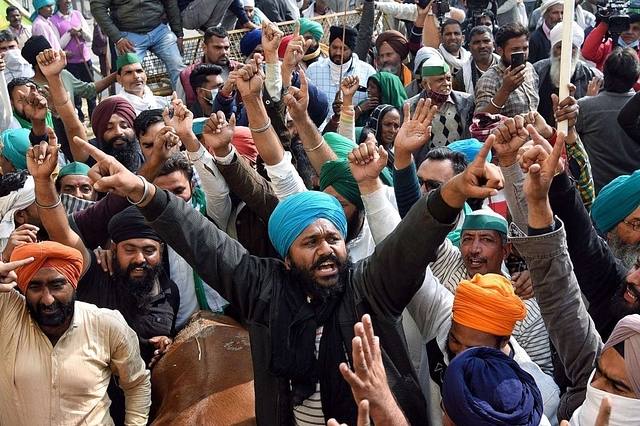
The Proud Punjab Farmer Is Not Going To Be Better Off With A Gold-Plated MSP Crutch
The cure for the Punjab farmer’s MSP addiction is not more of it, but rehab through reform.
The proud Punjab farmer must get rid of a leadership which says that he is incapable of standing on his own legs, but needs permanent crutches.
If there is anything that will help the Punjab farmer improve his lot, it will be the emergence of a more enlightened farm and political leadership. The current lot are leading them to their ultimate doom.
A proud and independent people, who are perfectly capable of standing on their own legs with marginal help, are being made to seek crutches and oppose three laws that will actually enable them to stand tall.
It is pathetic to see the leadership of the current Punjab-led farmer protests demand even more subsidies from the Centre when Punjabi agricultural households are the richest in the country, according to a research study.
The average Punjabi agricultural household earns more than Rs 2.77 lakh annually, when the all-India average is Rs 1.07 lakh and many states do even worse. And just in case you think the Punjab farmer is fighting for his poorer cousins in other states, perish the thought: in most other states, where land holdings are smaller, small and marginal farmers will benefit more from direct cash subsidies like PM Kisan or MGNREGA. MSPs benefit largely rich farmers, and most of them are in Punjab and Haryana.
It is true hypocrisy for the farm leadership to decline basic food at the dialogue with the government, when they keep demanding that the taxpayer feed them with free power, subsidised urea, seeds and diesel, and additionally buy paddy at Rs 18-19 a kg, which will then be handed over to two-thirds of the country at Rs 3 per kg of rice under the food security act.
On one TV channel, one farm leader complained that even though global fertiliser prices had fallen, this cost-saving by the exchequer was not used to further cut already-heavily subsidised urea prices. In other words, if global prices fall, they must benefit even more, and if prices rise, they will not pay more. Heads I win, tails you lose. The taxpayer has to lose both ways.
It is exceedingly pathetic and doubly hypocritical to see farm leaders, astride a tractor, roar like lions outside the gates of Delhi, while their supporters in Canada and the UK are mewing like cats around politicians abroad, seeking their support for India’s farmers. And this when Canada and other rich nations oppose India’s subsidies to farmers.
The Sikh population in Canada has gotten an opponent of Indian farm subsidies, Prime Minister Justin Trudeau, to back the protests in India. Maybe, India should hike tariffs on some Canadian imports to pay for these additional subsidies that Trudeau wants in India but opposes in Canada.
There is nothing more pathetic for fire-eating farmers to raise scare stories about the entry of corporates into contract farming. So, they can bring a powerful government to heel, but they are scared out of their wits if a Reliance Fresh or Cargill enters into agreements with farmers for long-term supplies of grains and horticulture products.
Anyone with an ounce of sense knows that governments are less vulnerable to farmer protests and mob fury than corporates. They can pay out of taxpayers’ pockets or buy peace, but corporates will lose.
Consider how easily the likes of Arvind Kejriwal and Prashant Bhushan could abuse corporates during the Anna agitation without any fear of legal reprisals. Consider how a bunch of anti-pollution activists got Sterlite to close down its Thoothukodi plant, causing huge damage to not only the company but our ability to produce our own crucial metals.
Consider how activists managed to delay the commissioning of the Koodankulam nuclear plant during the UPA (United Progressive Alliance) regime, causing enormous damage to its viability. If the public wants to curtail corporate interests, it can do so more easily for corporations have shareholders and employees to answer to.
It is thus an outright lie for farmers to pretend that they are scared of an Ambani or Adani entering into contracts for purchasing agricultural produce, when they can always bargain collectively for a good deal.
The worst hypocrisy of the Punjab farm leadership is simply this: if they can organise an effective farm protest to demand more from the government, and in the midst of a Covid pandemic, what stops them from organising their own farmers into strong producer organisations both to get good deals from buyers, and also to invest in forward linkages with retail chains and marketing organisations to improve their own incomes. This will deliver better outcomes than demanding unsustainable MSP policies.
Punjab’s farmers need help, but that help cannot be a higher or more widespread MSP. Punjab needs a long-term plan to get farmers out of water-intensive crops, and excess use of fertilisers, which is spoiling the land and making it less productive without even more intensive use of fertilisers.
As any anti-addiction therapist knows, the cure for drug addiction is not the more liberal supply of drugs, but rehab. The cure for the Punjab farmer’s MSP addiction is not more of it, but rehab through reform. The proud Punjab farmer must get rid of a leadership which says that he is incapable of standing on his own legs, but needs permanent crutches. Preferably gold-plated crutches.